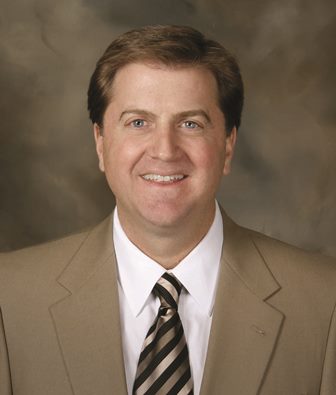
Kirk Edwards
Supporting UT institutions fosters intellectual growth as well as economic development, says Kirk Edwards.
Bringing Football to the Permian Basin
A successful place-kicker must possess certain qualities, such as flexibility, balance, strength and mental focus. In 1979, Kirk Edwards brought those traits with him as a walk-on place-kicker for the Longhorns of The University of Texas at Austin. He used those same assets—along with his degree in chemical engineering and a good dose of self-confidence—to secure his place as a leader in West Texas’ oil and gas industry; today, his company has working interests in more than 9,000 wells in the United States and the Gulf of Mexico.
Such success, of course, can result in many requests for his time and expertise. Still, no matter how far he may need to travel in response to such appeals, Kirk’s heart remains firmly fixed in his hometown of Odessa and on the sport that he says changed his life. “I was one of the biggest introverts in high school,” Kirk recalls. Then, in his junior year, he kicked his way onto the Odessa Permian High School football team. He excelled; so much so that he decided he wanted to compete on a collegiate level as well. When the several universities he was interested in acquired “other good place-kickers,” Kirk transferred to UT Austin. “I studied chemical engineering, was in a fraternity and was part of the football team. That made for an interesting college life, for sure.”
Kirk believes that students at The University of Texas of the Permian Basin (UTPB) should have a similar experience. Collegiate football, he says, helps build camaraderie. The game-day excitement is contagious, whether you’re on the field, in the stands or marching with the band. Football is fun, he says, and having a team is “a motivating thing for the campus,” as well as for the community in which the university is located. That’s why Kirk has been a driving force behind the campaign to bring football to UTPB. “Now is the right time,” he states. “When the [UT System] Board of Regents approved our initiative, it gave us the impetus to raise the money we needed to underwrite the team for the first five years.”
No stranger to the world of fundraising and philanthropy, Kirk has been generous in his support of his alma mater and has been a member of the Ashbel Smith Circle since 2008. He gives to several UT institutions, including UTPB and UT Austin, as well as the UT System, because he understands the need for broad support. “We have our flagship, but I also see how important it is to have UT institutions in far-flung areas of Texas, such as Tyler and the Rio Grande Valley, as well as the Permian Basin,” Kirk explains. “These areas are vitally important to the state.”
The UT System more than meets its obligation to steward the UT institutions located in the more remote areas of Texas, he says. Helping these universities grow fosters intellectual growth as well as economic development. Take UTPB, for example: “We have a very diverse population in West Texas and many of our first-generation college students can’t afford bigger universities,” Kirk states. “We have to build programs for them here.”
The need to provide a local supply of educated workers—especially engineers—has become clearly evident in West Texas, which is in the midst of an oil-boom renaissance. “Energy companies are coming back to West Texas and spending money drilling wells here,” says Kirk. UTPB, with private funding from donors and big gifts from companies like Chevron, has expanded its engineering program in an effort to meet the demand. “These students would have to go somewhere else if UTPB weren’t here. Now our kids don’t have to go out of the state, or our region, to get their degrees.”
Having that choice—that viable option to stay in one’s hometown to build a life—is important to Kirk. His own daughters opted to leave Odessa to attend universities in other towns, but he wants his community to prosper so his daughters can return should they want to. His daughters, Kirk notes, benefit by witnessing his involvement and generous contributions. “You can make a difference in our community and I want my girls to understand that,” says Kirk. The biggest lesson he hopes to impart: That there can be change and progress, “but you don’t just let it happen, you direct it.”